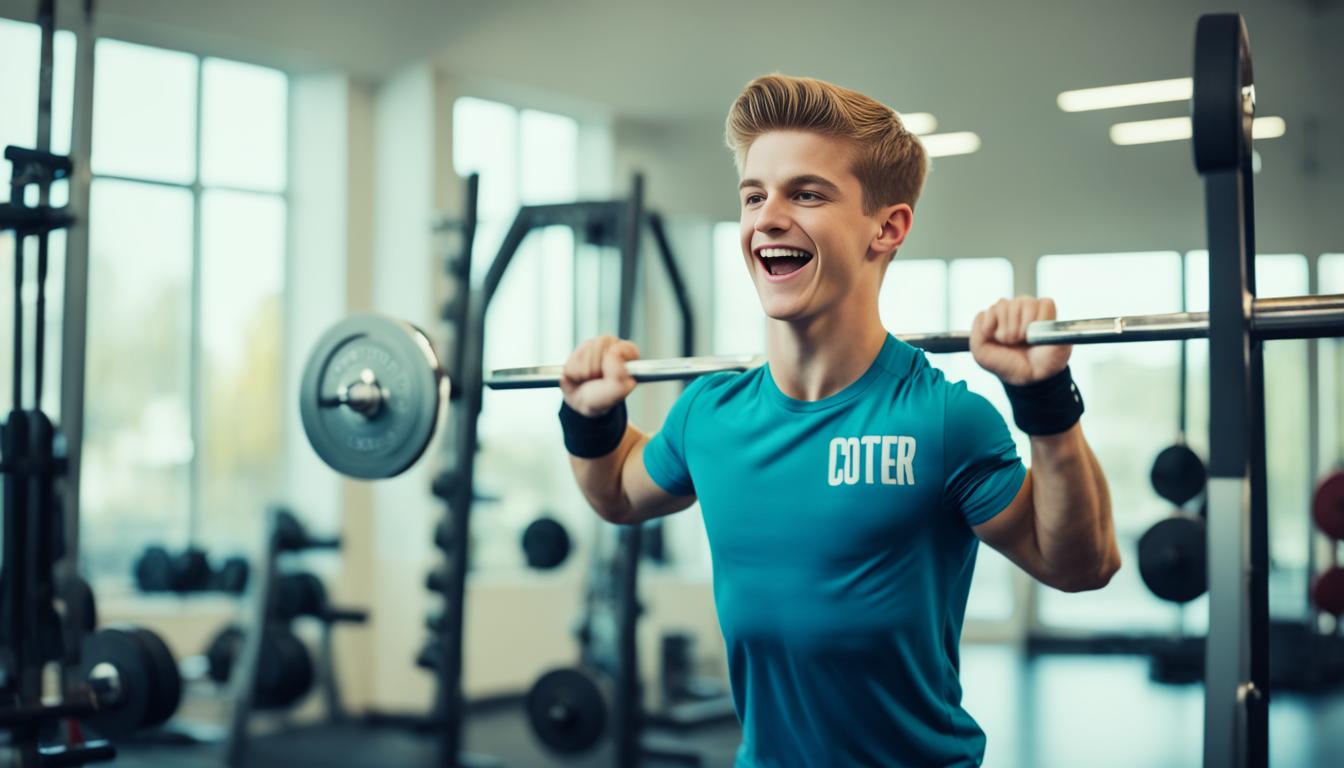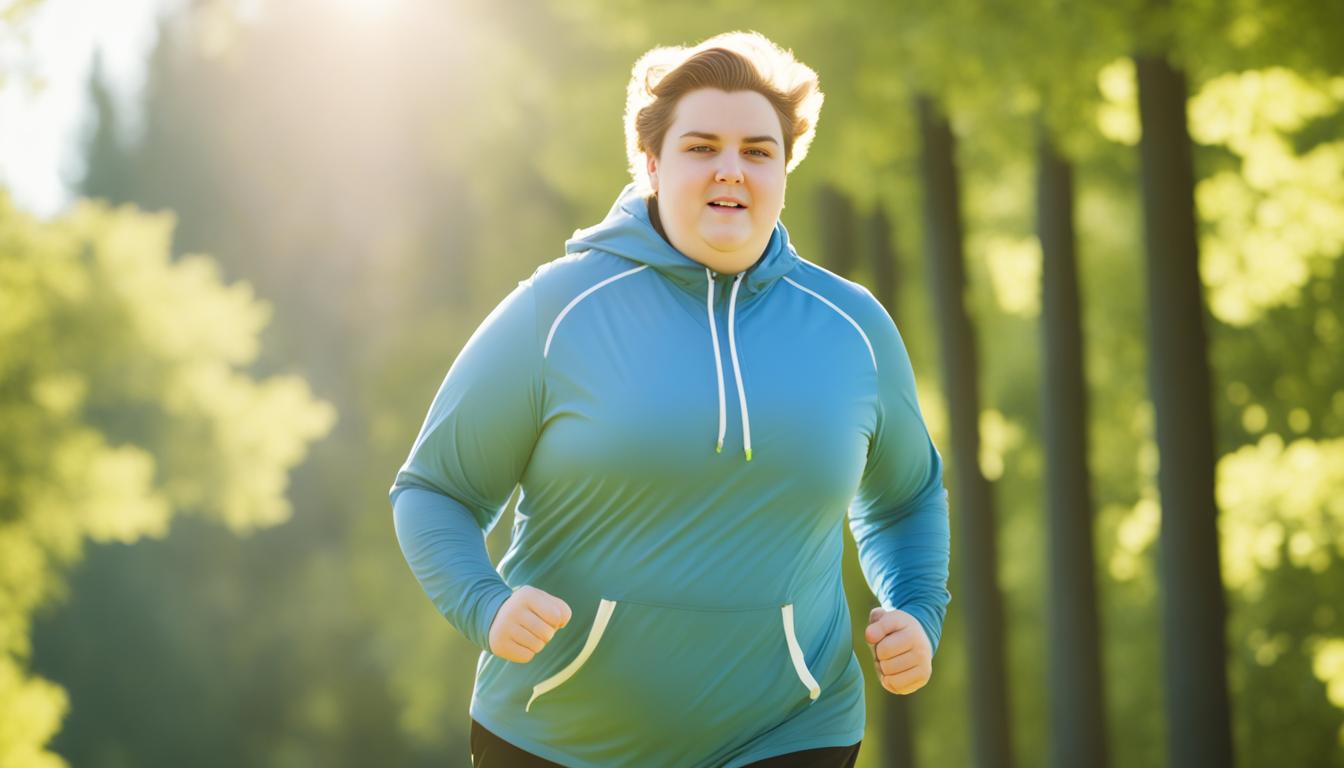Are you struggling to motivate your teenager to get moving? You’re not alone. Many parents face the challenge of getting their teens to exercise regularly. However, incorporating fitness into their daily routine is crucial for their overall health and well-being.
Regular exercise for teenagers has numerous benefits. It not only helps prevent health issues like high blood pressure, heart disease, and diabetes, but it can also reduce stress hormones, lower the risk of depression, and improve concentration and memory. By motivating your teen to exercise, you can instill healthy habits that will benefit them in the long run.
Key Takeaways:
- Regular physical activity is important for teens’ overall health and well-being.
- Exercise can prevent health issues and improve mental health in teenagers.
- Motivating teens to exercise helps build healthy habits for their future.
- Getting your teen involved in activities they enjoy can make exercise more enjoyable.
- Starting with small goals and gradually increasing intensity can build confidence.
The Benefits of Exercise for Teens
Regular exercise during the teenage years is crucial for the overall health and well-being of teenagers. It offers numerous benefits that contribute to their physical, mental, and social development.
Exercise is essential for muscle and bone development. It helps teenagers build strong bones and muscles, promoting healthy growth and development. Incorporating activities like resistance training and weight-bearing exercises can improve bone density and strength, reducing the risk of osteoporosis later in life.
Exercise boosts self-esteem and reduces stress. Engaging in physical activity releases endorphins, the feel-good hormones, which can elevate mood and improve overall mental well-being. Exercise has been shown to reduce stress levels and help teenagers better cope with the pressures of school and daily life.
Regular physical activity enhances sleep quality. Teenagers who exercise regularly often experience improved sleep patterns. Physical activity promotes better sleep quality, allowing teenagers to feel refreshed and energized for the day ahead.
Maintaining a healthy weight is another benefit of regular exercise for teenagers. Participating in physical activities helps burn calories, control weight, and reduce the risk of obesity. Additionally, exercise promotes the development of healthy habits that are essential for maintaining weight throughout life.
Exercise supports social interactions among teens. Participating in youth fitness programs, sports teams, or group exercises allows teenagers to interact with peers who share similar interests. This promotes social connections, teamwork, and the development of important social skills.
It is important to note that exercise should be complemented by a healthy nutrition plan to support overall health and maximize the benefits of physical activity. Teenagers should follow proper nutrition guidelines that include a balanced diet rich in fruits, vegetables, whole grains, lean proteins, and healthy fats.

Incorporating regular exercise into the lives of teenagers can have a significant positive impact on their physical, mental, and social well-being. By encouraging them to stay active, providing opportunities for exercise, and promoting healthy nutrition, parents and educators can help teens unlock the many benefits of fitness.
Motivating Teens to Exercise – 6 Methods
When it comes to motivating teens to exercise regularly, creating self-motivation is a key factor. Encouraging your teens to pursue activities they are passionate about can make exercise more enjoyable and meaningful for them. Whether it’s dancing, hiking, or playing a team sport, finding an activity that aligns with their interests can ignite their enthusiasm for physical fitness.
Starting with small exercise goals is another effective method. Setting achievable targets and gradually increasing the intensity and duration of their workouts can help teens build confidence and develop a routine. By taking small steps, they can overcome any initial reluctance and see tangible progress along the way.
Parents play a significant role in motivating their teens. Model positive exercise habits by making physical activity a regular part of your own routine. Show your support and provide encouragement by exercising together or cheering them on during their workouts. By being their biggest cheerleader, you can inspire and motivate them to stick to their exercise goals.
Making exercise fun and incorporating social elements can also boost teen exercise motivation. Encourage your teens to exercise with friends or join group fitness classes. Engaging in physical activities with others can create a sense of camaraderie and make the workout experience more enjoyable. Additionally, incorporating friendly competitions or games into their exercise routine can add an element of excitement.
Quote:
“Exercise is serious and challenging, but it should also be enjoyable and rewarding. Find ways to make it fun for your teens and they’ll be more likely to stick with it.” – Dr. Lisa Johnson, Pediatrician
Finally, regularly acknowledging and celebrating your teen’s progress can boost their motivation and self-confidence. Whether it’s a small achievement or a major milestone, praise their efforts and highlight how far they’ve come. These positive affirmations help them realize the significance of their hard work and encourage them to keep pushing forward.
Remember, motivation may vary from teen to teen, so it’s essential to explore different methods and find what works best for your child. By employing these six motivating methods, you can inspire your teens to embrace a healthy and active lifestyle that will benefit them both now and in the future.

How Much Exercise Should Teenagers Do?
When it comes to exercise for teens, it’s important to understand the recommended guidelines and the benefits of physical activity. According to UK guidelines, teenagers should aim for an average of at least 60 minutes of physical activity each day. This can include various types of exercise, such as walking, sports, and active hobbies.
Maintaining an active lifestyle during the teenage years not only promotes physical health but also sets the foundation for a healthier future. Research shows that individuals who engage in regular exercise during their teen years are more likely to continue being active as adults.
Exercise plays a crucial role in supporting overall health and development in teenagers. It helps strengthen their muscles and bones, improves cardiovascular health, and boosts mental well-being. Additionally, regular physical activity can reduce the risk of chronic diseases and improve concentration and academic performance.

Encouraging your teen to meet the recommended exercise guidelines can contribute to their long-term health and well-being. By incorporating various types of physical activities and making exercise a daily habit, you can empower your teenager to lead an active and healthy lifestyle.
Encouraging Teenagers to Be More Active
As a parent, you have a significant influence on your teenager’s lifestyle choices, including their level of physical activity. By setting a positive example and making exercise a regular part of your family routine, you can encourage your teen to be more active.
Making physical activity enjoyable and accessible can make a big difference. Consider incorporating activities like walking or doing active chores together. This not only helps your teen get moving but also strengthens family bonds.
Avoid linking exercise solely to weight and diet. Instead, focus on the positive effects of exercise on overall well-being. Emphasize how regular physical activity can boost mood, increase energy levels, and improve overall health.
Technology can also play a role in encouraging teens to exercise. Utilize fitness trackers and fitness apps that make exercise more engaging and enjoyable. These tools can help your teen set goals, track progress, and celebrate achievements.
Additionally, participating in events or activities as a family can provide motivation and a sense of accomplishment. Consider signing up for charity walks, fun runs, or adventure races. These experiences can create lasting memories for your family while fostering a love for physical activity.
Encouraging your teen to join sports teams or clubs can also provide a social element and spark their interest in exercise. Whether it’s soccer, tennis, dance, or martial arts, finding an activity that aligns with your teen’s interests can increase their motivation to stay active.
Inspire your teenager to lead a healthy, active lifestyle by showing your support and enthusiasm. Your positive influence can make a lasting impact on their exercise habits and overall well-being.

Fitness Tracker Apps: Making Exercise Fun and Engaging
Fitness tracker apps can be valuable tools in encouraging teenagers to stay active. These apps provide features like step tracking, workout routines, and fitness challenges. With colorful visuals and interactive interfaces, they transform exercise into a game-like experience, making it more enjoyable for teens.
Some popular fitness tracker apps for teenagers include:
“Strive: Teen Fitness Tracker” – This app offers personalized workout plans, nutrition tips, and a virtual community for teenagers to connect and share their fitness journey.
“Fitbod: Teen Gym Workouts” – Designed specifically for teenagers, this app provides customizable gym workout routines with step-by-step instructions and progress tracking.
“MyFitnessPal” – This app allows teenagers to track their food intake, set fitness goals, and monitor their progress. It also offers a wide range of exercise videos and nutrition tips.
By incorporating these apps into your teen’s exercise routine, you can make staying active more interactive and engaging. Remember to discuss the apps’ features and benefits with your teen to ensure they feel motivated and empowered to use them.
Overcoming Barriers and Starting Small
Starting an exercise routine can be challenging, especially for overweight teens. However, with the right support and guidance, they can overcome these barriers and embark on a journey towards a healthier lifestyle.
One effective approach is to start with small, achievable goals. This allows overweight teens to ease into exercise gradually, building their confidence and stamina along the way. By gradually increasing the intensity and duration of their workouts, they can make steady progress towards their fitness goals.
Another important factor is reducing sedentary behavior. Limiting screen time and incorporating physical activity during screen time can help overweight teens break the cycle of inactivity. Encouraging them to take short walks or do simple exercises while watching TV or using their devices can make a significant difference in their overall activity levels.
It’s also vital to offer a variety of physical activities that cater to the interests of overweight teens. When teens find exercise enjoyable and engaging, they are more motivated to participate. Whether it’s dancing, swimming, hiking, or playing a team sport, finding activities that resonate with them can increase their enthusiasm and commitment.
Strength training can be especially beneficial for teens who are not accustomed to aerobic exercise. It helps build muscle strength, improve overall fitness, and boost self-esteem. Incorporating activities like resistance training or using bodyweight exercises can provide a well-rounded exercise routine for overweight teens.
Lastly, encouraging participation in sports or outdoor activities can provide opportunities for exercise and enjoyment. Joining a sports team or engaging in outdoor adventures not only promotes physical fitness but also fosters social connections and a sense of belonging.
By addressing these barriers and starting small, we can help overweight teens develop a routine that supports their physical and mental well-being. Encouraging them to take that first step towards a healthier lifestyle can have lasting benefits for their overall health and self-confidence.

Conclusion
Helping your teen establish regular exercise habits is crucial for their long-term health and well-being. By incorporating various motivating methods and providing support and encouragement, parents can empower their teens to make exercise a part of their daily lives.
Starting small, setting realistic goals, and focusing on the positive effects of exercise can help teenagers develop a positive attitude towards physical activity. Regular exercise during the teenage years not only promotes physical fitness but also contributes to improved mental well-being, concentration, and memory. Moreover, it reduces the risk of health issues like high blood pressure, heart disease, and diabetes.
Ultimately, developing an active and healthy lifestyle is a journey that requires patience and consistency. With the right approach, teens can experience the physical, mental, and social benefits of exercise for years to come. Encouraging your teen to prioritize exercise and adopting healthy habits will lay a solid foundation for their overall well-being and set them on the path to a thriving, healthy life.
FAQ
How important is exercise for teenagers?
Regular physical activity is crucial for teenagers’ overall health and well-being. It can prevent health issues like high blood pressure, heart disease, and diabetes. Additionally, exercise can reduce stress hormones, lower the risk of depression, and improve concentration and memory in teenagers.
Why is it important to motivate teens to exercise?
Motivating teens to exercise is important for building healthy habits that will benefit them in the long run. Exercise during the teenage years is essential for muscle and bone development. Regular physical activity can also boost self-esteem, reduce stress, improve mental well-being, and enhance sleep quality for teenagers.
How can I motivate my teen to exercise?
There are several methods you can try to motivate your teen to exercise. Some effective strategies include creating self-motivation, encouraging them to pursue activities they are passionate about, starting with small exercise goals and gradually increasing intensity, and modeling positive exercise habits as a parent.
How much exercise should teenagers do?
UK guidelines recommend that teenagers aim for an average of at least 60 minutes of physical activity each day. This can include various types of exercise, such as walking, sports, and active hobbies.
How can I encourage my teenager to be more active?
There are several ways you can encourage your teenager to be more active. You can set a positive example as a parent by being physically active yourself, make physical activity a daily part of the family routine, avoid linking exercise to weight and diet, utilize technology to make exercise more engaging, and encourage your teen to join sports teams or clubs.
What are some tips for helping overweight teens start an exercise routine?
Starting small and setting achievable goals is key for helping overweight teens start an exercise routine. Gradually increasing intensity and duration can help them ease into exercise. Providing support and encouragement, offering a variety of physical activities catered to their interests, and incorporating strength training can also be helpful.
Why is it important to develop regular exercise habits during the teenage years?
Developing regular exercise habits during the teenage years is crucial for long-term health and well-being. It increases the likelihood of being active as an adult and brings various physical, mental, and social benefits. Incorporating various motivating methods, providing support and encouragement, and focusing on positive effects can help teenagers develop a positive attitude towards physical activity.
Source Links
- https://overthoughtthis.com/6-methods-to-inspire-your-teen-to-get-exercise/
- https://www.bupa.co.uk/newsroom/ourviews/teenager-exercise-ideas
- https://www.webmd.com/parenting/get-teens-moving


